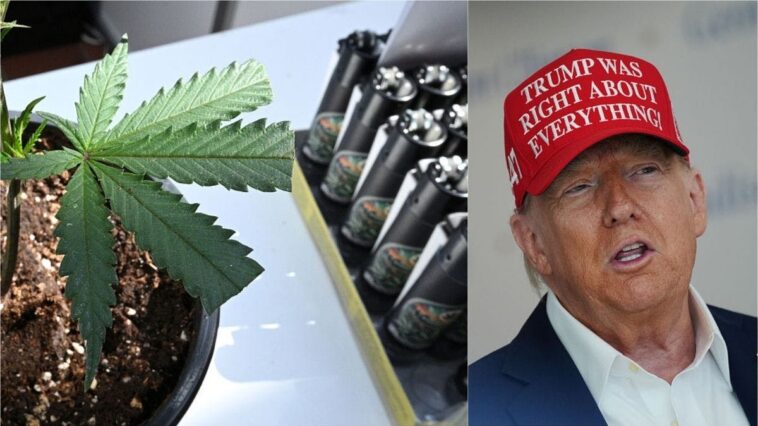Nearly 50 organizations signed a letter sent to President Donald Trump on Monday, urging Trump to keep Marijuana labeled as a Schedule I drug after the administration sparked fierce debate when it announced it was considering downgrading weed’s classification.
The groups — which include faith-based, law enforcement, public policy, and health care organizations — argue that downgrading marijuana’s classification would “result in serious harm to public health and safety,” according to a copy of the letter obtained by The Daily Wire. Trump raised eyebrows earlier this month when he said during a White House press briefing that his administration would “make a determination over the next few weeks” on whether to reclassify marijuana.
During his comments on the drug, Trump acknowledged that marijuana can have negative effects on people, especially children. The organizations behind Monday’s letter to Trump hope that the president will continue to consider the health of American children when his administration reviews weed’s classification.
“You have an opportunity to make a stand for the safety of children across America by opposing the flawed proposal to reschedule marijuana,” the letter states.
“Arguments like ‘marijuana should not be in the same category as heroin’ are politically salient and easy to understand, but they fundamentally misunderstand how drug scheduling works,” the letter continues. “Contrary to popular belief, drug scheduling is not a harm index. Rather, it balances the accepted medical use of a substance with its potential for abuse. Schedule I drugs have no accepted, safe medical use and a high potential for abuse. Marijuana fits squarely within this definition, a fact acknowledged in every scheduling review prior to 2023 (the Obama Administration recommended against rescheduling in 2016).”
Discussions within the Trump administration have focused on classifying the drug as Schedule III, The Wall Street Journal reported. Reclassifying marijuana as Schedule III would put the drug in the same category as drugs that have “a moderate to low potential for physical and psychological dependence.”
The issue has divided Americans, including those who are among Trump’s base. The president told reporters on August 11 that marijuana is “a very complicated subject.”
“I’ve heard great things having to do with medical [marijuana], and I’ve [heard] bad things having to do with just about everything else,” he said.
Among the groups pushing Trump to keep marijuana drug classification the same are the National Narcotic Officers’ Associations’ Coalition and the Drug Enforcement Association of Federal Narcotics Agents (DEAFNA). Conservative groups such as CatholicVote and the Family Research Council also signed the letter.
The letter points out that findings from the Centers for Disease Control show that 30% of cannabis users meet the clinical definition of having cannabis use disorder, and cannabis users have a 30% chance of getting addicted. Marijuana is also getting stronger.
“The amount of THC in cannabis has increased over the past few decades. Products with high concentrations of THC can have greater intoxicating effects and increase the risk of overconsumption,” the CDC stated. The government agency added that there is some evidence “that high THC concentration cannabis use by adolescents and young adults is associated with continued use and development of future mental health symptoms and disorders.”
Eric Brown, president of the National Narcotic Officers’ Association Coalition said that narcotics officers witness the “far-reaching consequences” of marijuana abuse “every day.”
“Efforts to reschedule marijuana risk sending the wrong message — that the substance is safe — while ignoring the science and significant dangers associated with its use,” he said. “Rescheduling would only accelerate marijuana consumption, driving higher rates of substance abuse and increasing demands on already strained public safety resources and budgets. We strongly urge the Administration to reject any effort to reclassify marijuana from Schedule I to Schedule III.”
The groups also argued that “Marijuana has not been approved for any medical use by the FDA, and it likely never will.” While it’s true that the FDA has not approved marijuana itself to be prescribed for any medical condition, the agency has approved purified forms of the drug, such as Epidiolex, which treats seizures.
“The agency also has approved Marinol and Syndros for therapeutic uses in the United States, including for nausea associated with cancer chemotherapy and for the treatment of anorexia associated with weight loss in AIDS patients,” the FDA stated.
Proponents of downgrading marijuana’s classification point out that moving it from Schedule I to Schedule III wouldn’t legalize the drug at the federal level, but would only reduce the scale of marijuana-related offenses. Some states have passed laws legalizing recreational and medical marijuana use, and legalization has become a hot topic in recent years, as pro-cannabis groups have pushed politicians, including Trump, to join their side on the issue.
The pro-weed coalition is moving the needle in their direction on public opinion — and not just on reclassifying weed, but also legalizing it at the federal level. A Pew Research poll conducted last year showed that a majority of Americans (57%) believe that both medical and recreational marijuana should be legal, and 32% said it should be legal for medical use only. Just 11% of respondents said marijuana should be illegal.
Trump addressed the issue at the White House earlier this month after he floated the idea of reclassifying marijuana during a fundraiser at his New Jersey golf club earlier this month, according to the WSJ. Among the guests at the golf club when Trump hinted at the move was Kim Rivers, the CEO of Trulieve, one of the largest marijuana companies in the United States.
Trump also sided with the pro-marijuana crowd last year in Florida, when he voted to legalize recreational use of the drug in his home state. The marijuana amendment push in Florida received 56%, falling just short of the 60% needed to pass it into law. Legalization efforts also failed in North Dakota and South Dakota last year.
A White House official told the WSJ earlier this month that Trump wants to take on issues like marijuana that are viewed as “80-20 cultural issues.” If the president were to take the side of weed proponents, it could also help him and Republicans among independent and young voters in the 2026 midterms.
But according to the group of organizations pushing Trump to say no to downgrading the drug, the risks of reclassifying marijuana far outweigh any potential electoral advantage such a move would give Republicans. The letter highlights how a reclassification of marijuana to Schedule III would end marijuana test requirements for people with numerous important jobs.
In 2024, the National Transportation Safety Board said that “HHS-certified laboratories used for such testing are not authorized to test for Schedule III controlled substances. This would mean that airline pilots, airline maintenance workers, bus and truck drivers, locomotive engineers, subway train operators, ship captains, pipeline operators, personnel transporting hazardous materials, and other safety-sensitive transportation employees would be prevented from being tested for marijuana use.”
Downgrading marijuana to Schedule III would also give dispensaries massive tax breaks, the group points out, arguing that “street dealers and dispensaries alike would be able to receive reductions for promoting or marketing the sale of addictive drugs.” In the letter, the group also states that international drug cartels and Chinese money launderers that operate marijuana farms in the United States could also benefit from a major tax break if weed is rescheduled.
According to the group urging Trump to keep marijuana a Schedule III drug, America’s drug problem would only get worse if the federal government takes a more lenient stance on weed. Travis Weber, the vice president for Policy and Government Affairs at the Family Research Council, said, “The deep pain and crisis of meaning that many in our nation are facing will not be made better by encouraging even more drug use, which is what rescheduling would do. Taking substances to temporarily “treat” our mind and body alone can never solve what is really a spiritual problem. Drugs won’t fill the void inside and heal our pain. Only Jesus can do that.”
Read the full letter here.



